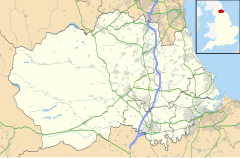|
Langley Moor
Langley Moor is an old pit village in County Durham, England. It is located approximately 2 miles south-west of Durham City. Langley Moor is within the civil parish of Brandon and Byshottles which is itself within the City of Durham constituency, as of 2019 represented by Mary Foy MP. HistoryThe village consists of a large park, three pubs, three schools, a church and an industrial estate. Holliday Park (previously Bents Park, known locally as Boyne Park after Lord Boyne) is located to the north of the village, and was renovated in 2016 with a new children's play area. [1] The park also provides access to the River Browney which runs through it. The park was donated to the public by local alderman and philanthropist Martin Forster Holliday (1848-1935), [2] who was the manager and agent for three North Brancepeth Coal Company collieries (Broompark, Boyne and Littleburn - the latter two being in the village) from 1884 until 1922. [2] The three pubs in the village are The Station, The New Cross (formerly The Langley Moor Hotel, as of 2022 currently closed) and The Lord Boyne Hotel. Historically, the village had two inns, the Littleburn Hotel, two more pubs, two cinemas, a working men's club (now residential flats), a post office, a bank and Salvation Army barracks. [3][4] The East Coast Main Line, one of Britain's arterial rail links, runs directly through the village over the high street. Langley Moor is also home to two supermarkets, a Tesco Metro (formerly Safeway, Somerfield) and Lidl. GeographyThe village is located on the A690 approximately 2 miles south-west of Durham and approximately 15 miles south of Newcastle-upon-Tyne. The Brandon - Bishop Auckland Railway Path is a rail trail stretching nine-miles of scenic woodland which follows the route of the former Durham to Bishop Auckland Line and runs through Langley Moor. [5] EducationThere are three schools in Langley Moor, two primary schools and one nursery school:
ReligionThe church, St. Patrick's Roman Catholic Church, is located on the border with Meadowfield, which opened on 8 October 1911. [10] The estimated cost of the church was £3,000 (which equals £376,523.30 as of May 2022). [10] Historically, Langley Moor had a methodist church, a Wesleyan church, a baptist church and a United Methodist church. [3][4] IndustryLittleburn Industrial Estate is home to Harrison & Harrison organ builders, who have been involved with organs in cathedrals and churches across the globe. Coal miningBoyne CollieryBoyne Colliery opened in approximately 1864 under the ownership of W. Mickle and James Snowball, [11] coal was struck the following year. [12] It was sold to the North Brancepeth Coal Company in the 1880s, under the management of John L. Morland from 1880 until 1884. That same year Martin F. Holliday became agent and manager of the colliery until it closed at some point after 1890. [13] Littleburn Colliery (also known as North Brancepeth Colliery)Littleburn Colliery opened in approximately 1840, it had a handful of owners including North Brancepeth Coal Company, who bought the colliery in the 1880s. In 1925, at its peak, the pit employed 779 people. The colliery mined coal throughout its operational life. Martin F. Holliday became agent of the colliery in 1909 until his retirement in 1922. Littleburn Colliery closed in December 1950. [14] References
External links
Information related to Langley Moor |
||||||||||||||||||||||||||||||||||||||

